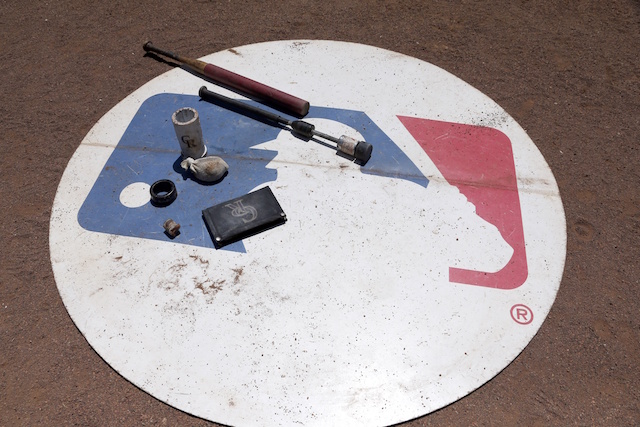Major League Baseball commissioner Rob Manfred and the owners came to terms with the MLB Players Association on Wednesday night on a new collective bargaining agreement. The handshake agreement was reported roughly three hours prior to the current CBA expiring at 12:01 a.m. ET.
The new, five-year CBA must be ratified by owners and players in order to become final. But as expected, there are multiple changes that will go into effect for the 2017 season and one year from now.
Per the Associated Press, stints on the disabled list have been trimmed from 15 to 10 days
Major topics of discussion were the qualifying offer system, the possibility of an international draft, roster expansion, and competitive balance — or luxury tax — thresholds.
While there was a previous indication the qualifying offer would be banished, it remains part of the CBA, though with notable modifications.
Players can no longer be extended a qualifying offer more than one time, which draft pick(s) a club loses by signing a player who rejected the one-year pact is based on luxury tax thresholds, and a barometer must be crossed in order for a team to receive compensation for losing their free agent, via Ken Rosenthal of FOX Sports:
Some additional details on new CBA coming, starting with this: A player no longer can receive a qualifying offer more than once.
— Ken Rosenthal (@Ken_Rosenthal) December 1, 2016
Team that loses QO free agent will get pick only if player signs contract of $50M+. Pick it gets will depend upon that team’s market size.
— Ken Rosenthal (@Ken_Rosenthal) December 1, 2016
Club that signs QO free agent, if it exceeds luxury-tax threshold, will lose 2nd-rounder, 5th-rounder and $1M in int’l bonus money.
— Ken Rosenthal (@Ken_Rosenthal) December 1, 2016
Club that signs QO free agent, if it does not exceed luxury-tax threshold, will lose 3rd-rounder.
— Ken Rosenthal (@Ken_Rosenthal) December 1, 2016
As for the luxury tax, the threshold will be set at $195 million for 2017, which is an increase from $189 million in 2015 and ’16. The threshold amount will then see incremental increases over the lifetime of the CBA, per ESPN’s Jayson Stark:
Luxury tax thresholds in the new labor deal: $195 million in 2017, then $197M, $206M, $208M and $210M
— Jayson Stark (@jaysonst) December 1, 2016
Whereas the maximum penalty for clubs that exceeded the threshold was 50 percent, that will rise, via Joel Sherman of The New York Post:
Hear new CBA will have 60-70 pct penalty for those extremely over threshold, about $250M payrolls or greater. Currently highest is 50 pct
— Joel Sherman (@Joelsherman1) December 1, 2016
Exceeding the competitive balance tax by an excessive amount will face an additional penalty percentage, per Bob Nightengale of USA TODAY Sports:
The tax rate for teams exceeding luxury tax: 20% (1st time), 30% (2nd time), 50% (3rd time). For teams going $20M to $40M over,add extra 12%
— Bob Nightengale (@BNightengale) December 1, 2016
This is of particular importance to the Los Angeles Dodgers, who paid a record $43.7 million luxury tax bill after the 2015 season. Los Angeles faces a similar penalty this offseason, though the amount should be closer to $30 million.
The Dodgers have already begun the shift to infusing their roster with home-grown talent, which invariably is aiding their efforts to reduce payroll.
One of the more intriguing possibilities had active rosters expanding to 26 or 27 players, and the number capped around 30 players come Sept. 1. However, it will be the status quo under the new CBA, according to Stark:
Was also told that roster size won't change at all. Remains at 25 before Sept. 1, and at 40 after Sept. 1.
— Jayson Stark (@jaysonst) December 1, 2016
As for the international draft that appeared to be a long shot, it was not added to the agreement, but international spending will be limited for each club per year, via Jon Heyman of Today’s Knuckleball:
That reasonable int'l pool effectively eliminates super bonuses for young international stars, like moncada, guerrero, etc.
— Jon Heyman (@JonHeyman) December 1, 2016
Coinciding with that, Cuban players can be exempt from spending limitations by meeting the age and experience in Serie Nacional requirements, per Jon Morosi of MLB Network:
Correcting earlier note: Cubans exempt from international pool if they are 25 years old with 6+ years of experience.
— Jon Morosi (@jonmorosi) December 1, 2016
It’s unclear how the new international spending guidelines may impact players from countries other than Cuba. Additional details and clarification should become available once the CBA is ratified.






